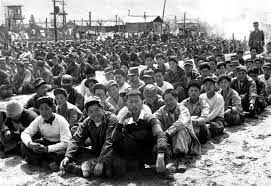How
many people have heard of Cowra POW camp?
Cowra
is in New South Wales, near Bathurst during the second world war it
was the site of a prisoner of war camp. It housed mostly Japanese and
Italian
prisoners, with some Korean and Indonesian civilians detained at the
request of the Dutch East Indies government. It began operating in
June, 1941, specially built to house POWs brought to Australia from
overseas.
It
was divided into four areas, each surrounded by barbed wire fences,
the prisoners first lived in huts, but eventually included its own
store, kitchen, mess huts, showers and vegetable gardens.
There
were other POW camps in Australia in fact most states had prisoner of
war camps as well as interment camps.
On
5 August 1944, Japanese prisoners of war housed in the detention
camp in Cowra, New South Wales staged a breakout. Armed with
improvised weapons including baseball bats and sharpened mess knives,
they stormed the perimeter fences and overcame the machine gun posts.
Never likely to be successful, the breakout resulted in the death of
231 Japanese prisoners with a further 108 wounded. All survivors were
recaptured in the surrounding countryside in the days that followed.
It is widely believed the goal of the breakout was for the
Australian's to kill the Japanese, as they felt it brought shame to
themselves and their families to be POWs.
Four
Australians were killed in the breakout – Privates Benjamin Gower
Hardy, Ralph Jones and Charles Henry Shepherd. Lieutenant Harry
Doncaster was killed when ambushed during the recapture of the
prisoners. Hardy and Jones were posthumously awarded the George
Cross.
A
Military Court of Inquiry investigated the incident, and a summary of
its findings was read to the House of Representatives by Prime
Minister John Curtin on 8 September 1944.
The
summary indicated the following:
- that conditions at the camp were fully in accordance with the International Convention;
- that no complaints regarding treatment had been made by or on behalf of the Japanese prior to the incident, which appeared to have been a premeditated and concerted plan of the prisoners;
- that the actions of the Australian garrison in resisting the attack averted greater loss of life, and that firing ceased as soon as control was assured; and
- that many of the dead had died by suicide or by the hand of other prisoners, and that many of the wounded had suffered self-inflicted wounds.









Sad period of time. many of them were citizens of Australia but were of ethnic background.
ReplyDeleteSo true
DeleteHello greetings and good wishes.
ReplyDeleteJapanese are proud and brave people. Even assuming that they have killed themselves, they are only exhibiting their valor and patriotism.
You must have heard of Samurai warriors from Japan. They can never be captured. If captured they will kill themselves instead of being humiliated as POW's.. It is their tradition to die for their country and in honor.
Here is a paragraph taken from the net.
One of the most terrifying things about the way of the samurai is seppuku (also known as “hara-kiri”). It is the gruesome suicide a samurai must perform if he fails to follow bushido or is likely to be captured by enemy. Seppuku can be either a voluntary act or a punishment. Either way, it is generally seen as an extremely honorable way to die.
Hope you have the movie The Last Samurai,
Interesting post
Best wishes
Glad you liked the post and yes I know about the samurai and about honour deaths
DeleteHi, Jo-Anne! I didn't know about those Australian interment camps and I thank you for enlightening me with this article. It is very interesting that the Japanese prisoners are believed to have planned and staged the ill fated break-out as a way to die with honor.
ReplyDeleteThank you, dear friend Jo-Anne, and enjoy the week ahead!
Glad you liked the post and I knew about the breakout but thought many others may not
DeleteI didn't even know Australia had interment camps. History is not my best subject…now hubby, he probably knew.
ReplyDeleteI am sure you are not alone with the not knowing
DeleteInteresting stuff. Having Italians there kinda surprised me. Thank you for the details on the escape attempt.
ReplyDeleteI knew about the Japanese but not the Italians as well
DeleteYes Jo-Anne, have been to Cowra and that place plus the graves. It's interesting, and I didn't know anything about Cowra until I went there..
ReplyDeleteI have also been to Cowra many years ago, I would like to go back because I was a child the last time I went there
DeleteWere the Japanese who lived in Australia forced into camps as they were in the U.S.? What about Germans?
ReplyDeleteLove,
Janie
Yes they were, as were the Germans as far as I know
DeleteI knew nothing of this. What a sad event - war is such s terrible thing.😔
ReplyDelete